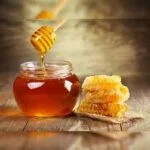The Youths for Apiculture Initiative (YFAI) has expressed concern over the growing adulteration of honey in Nigeria and has offered consumers practical methods to detect genuine, untainted honey for better health outcomes.
Mr Kingsley Nwaogu, National President of YFAI and CEO of Makizi Raw Honey, shared the insights during an interview in Lagos, highlighting the difficulty consumers face in identifying pure honey.
“It is really a serious concern to identify pure unadulterated honey,” he said. “The best way is through laboratory analysis, but where this is unavailable, consumers can rely on certain physical indicators.”
Nwaogu outlined three key indicators: colour, taste, and viscosity.
According to him, pure honey typically has a golden hue, though this may vary slightly based on the vegetation around the apiary. It is usually not overly thick or dark. He also noted that “pure honey does not leave a sugary aftertaste; the sweetness fades almost immediately after consumption.”
On viscosity, he explained that pure honey flows with consistent fluidity. “It doesn’t break or drip unevenly like adulterated versions or thick oils,” he said.
To combat the spread of fake honey, the YFAI has taken steps to identify authentic producers through ID cards and traceable identification numbers.
“Consumers should request the ID card of the beekeeper before purchasing,” he said. “We issue a unique number to every verified producer, which buyers can scan to confirm authenticity.”
He advised consumers to ask about the origin of the honey and ensure it is traceable to a known, trustworthy source.
Nwaogu further stressed that expanding the honey value chain requires commitment to quality. “We must sensitise new and existing producers about the health implications of adulteration,” he said. “Beekeeping is not just for profit—it contributes to food crop productivity and ecological balance.”
He called for greater honesty in honey production and a shift in focus from profit to public health, adding that “export potential can only be realised through genuine, high-quality products.”
(NAN)


